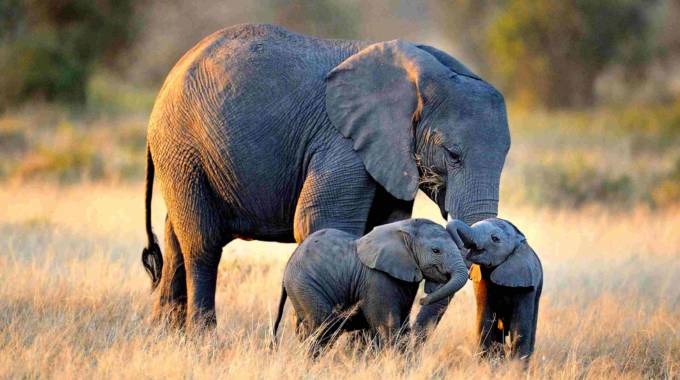
Tinashe Farawo
ZIMBABWE has a proud history of successful elephant conservation and is one of the key elephant range states and home to the second-largest elephant population after Botswana.
Elephants are distributed in four main regions in Zimbabwe: Northwest Matabeleland (Hwange-Matetsi), Sebungwe, mid-Zambezi Valley, and South-East Lowveld (Gonarezhou).
These ranges cover different land tenure categories in Zimbabwe, which include parks estates, privately-owned land, communal land and indigenous forest areas.
The country has an elephant population estimated at 84 000, according to the last census conducted in 2014.
Ensuring the safety and conservation of these animals is the responsibility of the Zimbabwe Parks and Wildlife Management Authority (ZimParks).
Needless to say, ZimParks is probably the only wildlife management agency in the world that does not receive funding from the central Government for conservation purposes.
As a result, we believe that wildlife should pay for its upkeep and protection.
Conservation of wildlife is expensive.
ZimParks has been unable to generate enough resources to support its conservation operations.
The situation has been made worse by the Covid-19 pandemic, which has resulted in the drying up of tourism receipts.
ZimParks deputy director general Mr Geofreys Matipano contends that economic sanctions imposed on the country by the West have worsened the situation.
“Zimbabwe is under illegal sanctions imposed by Europe and the United States of America that have an immense influence on natural resource conservation,” said Mr Matipano.
“These countries influence International Financial Institutions, International Aid Organisations, International Development Partners and donors to withhold meaningful support for Zimbabwe in the form of aid, grants and lines of credit for economic recovery and conservation programmes.
“Conservation work is extremely difficult in an economy under sanctions.”
To add insult to injury, the same countries that have imposed sanctions on the country have coalesced around bullying weaker nations into withdrawing support for Zimbabwe at international conservation forums such as CITES.
Zimbabwe has for years sought permission at CITES to sell its elephants and other wildlife products.
As a result, Zimbabwe is stuck with over 130 tonnes of ivory and over 5 tonnes of rhino horn.
In addition to incurring costs of managing wildlife in the bushes, Zimparks is also incurring the huge costs that come with preserving a growing stock of ivory and rhino horns worth hundreds of millions of dollars.
The central vault, which keeps ivory from wildlife management ranges including state gazetted wildlife areas, gazetted indigenous forests, and communal lands, is under immense strain.
According to Mr Matipano, there was a need to overhaul the mind-set in CITES in order to move the organisation from just listing species under Appendices on account of emotion and not science.
Instead, CITES should transform into a pragmatic organ facilitating the conservation of wildlife through international trade.
Zimbabwe is lobbying for CITES or an alternative organisation to help release the financial potential held in ivory and rhino horn stocks stashed in our vaults for the benefit not only of wildlife but communities who share borders with these animals.
Over the years, these overbearing countries have ganged up with animal rights activists to stop hunting and the trade in wildlife products.
Elephants and indeed all our animals need protection from poachers and this requires resources for our brave men and women in the bush.
They need uniforms, boots and rifles among other things.
Sadly, these hostile nations and animal rights activists are suffocating our resource streams which we need to support conservation.
Wildlife is not conserved through trade bans and restrictions, and stifling resource streams.
Encouragingly, a few international conservation organisations are beginning to see the wisdom in Zimbabwe’s approach and are rendering support to our efforts.
The ever-increasing elephant population in the country is not by accident.
It is a result of excellent conservation of the species and integrity of the wildlife habitat.
The country pursues a philosophy of sustainable consumptive and non-consumptive use of its natural resources for economic development.
This philosophy is grounded on the creation of value for wildlife and in turn, this has incentivised conservation efforts as more people spare land for wildlife instead of cropping.
Zimbabwe developed and is implementing sound conservation policies, and species-specific action plans for elephants, rhinos, lions and other animals.
Application of these strategies has resulted in the decline of poaching of key wildlife species since 2013.
The downside of the high elephant population is conflict, especially with local communities who live with wildlife and or share boundaries with the major protected areas.
In the past five years, nearly 500 lives have been lost while 582 cattle were lost to wildlife attacks.
Thousands of hectares of crops have been destroyed.
Over the same period, 153 people were injured by wildlife.
In order for our people to appreciate the importance of these animals as economic enablers, we need resources to build schools, clinics, roads and economic infrastructure from these natural resources.
Wildlife must contribute resources for community development, management of human-wildlife conflicts and its conservation.
This can only be achieved by allowing us to trade in wildlife particularly elephants.
We have made an undertaking to harvest elephants in a sustainable manner and abide by international wildlife trade regulations governed by CITES and our national laws.
In the spirit of transparency, we have disclosed to the world the number of elephants we sold, how much we received from the sales and what we did with the money.
In addition, we undergo annual audits by the Auditor-General and have never been found on the wrong side since the assumption of office by Dr Fulton Upenyu Mangwanya’s management team in 2017.
The Government takes seriously the conservation of wildlife and will continue to implement a mix of strategies including anti-poaching and anti-illegal trade, lobbying for the removal of the trade restrictions, exploring alternative mechanisms for the ivory trade, and revamping its eco-tourism and resource mobilisation.
Tinashe Farawo is the head of communications at the Zimbabwe Parks and Wildlife Management Authority.
